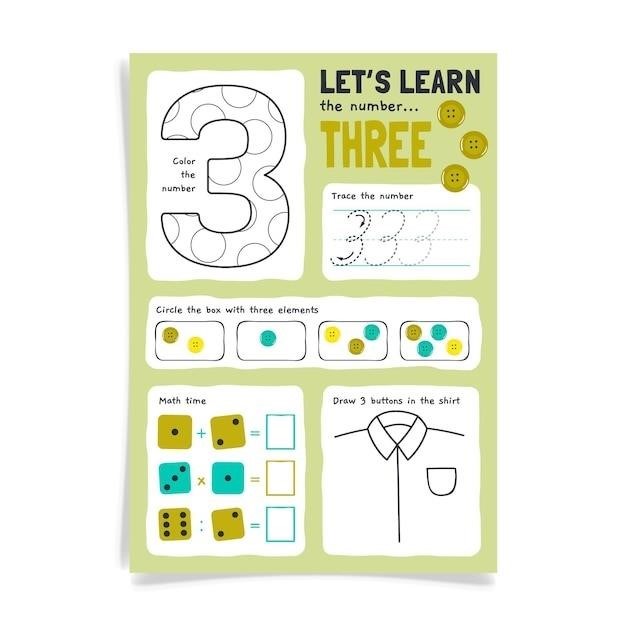Finding Free CogAT 3rd Grade PDF Practice Tests
Several websites offer free sample CogAT tests for 3rd graders in PDF format. These downloadable resources provide valuable practice questions and explanations, helping students familiarize themselves with the test format and question types before the actual exam. Look for reputable educational websites offering such materials.
Locating Reliable Online Resources
Finding trustworthy sources for free CogAT 3rd-grade practice tests requires careful selection. Reputable educational websites often provide sample questions and materials. Look for sites with a history of providing accurate and helpful test preparation resources. Be wary of sites offering complete tests for free, as these may not accurately reflect the actual CogAT’s format or difficulty. Check for reviews and testimonials from other users to gauge the reliability of a resource. The quality of explanations accompanying the practice questions is crucial; thorough explanations are essential for understanding the reasoning behind correct answers and identifying areas needing further study. Prioritize sites that provide detailed answer keys and explanations that go beyond simply stating the correct choice. This ensures effective learning and improvement. Remember to verify the source’s credentials and focus on sites offering materials aligned with the official CogAT format and content for the 3rd-grade level.
Utilizing Free Sample Tests and Questions
Free sample CogAT tests and questions offer invaluable preparation for the actual exam. These resources allow students to become comfortable with the test’s structure, question types, and timing. Start with shorter practice sessions to avoid overwhelming the student. Focus on understanding the concepts behind each question rather than simply memorizing answers. Use the practice tests to identify areas of strength and weakness. If a student consistently struggles with a specific question type, such as verbal analogies or quantitative comparisons, dedicate extra time to mastering that area. Encourage the student to review the explanations provided with the sample questions. Understanding the why behind a correct answer is just as important as getting the answer itself. Regularly spaced practice sessions are more effective than cramming. Simulate testing conditions by setting a timer and creating a quiet workspace. This helps reduce test anxiety and builds confidence. Remember that the goal is not just to get the right answers but to improve problem-solving skills and develop effective strategies for approaching different question types on the CogAT. Consistent practice with sample tests will significantly enhance performance on the actual exam.
Printable PDFs for Offline Practice
The convenience of printable CogAT practice tests in PDF format is undeniable. These downloadable resources offer flexibility, allowing students to practice anytime, anywhere, without needing internet access. This is particularly beneficial for students who prefer a hands-on approach to learning or who may not have consistent online access. Printing the PDFs allows for focused, distraction-free practice sessions. Students can easily mark answers, make notes, and review their work without the distractions of a computer screen. Parents can also use printable PDFs to create personalized practice plans tailored to their child’s strengths and weaknesses. The ability to print multiple copies allows for repeated practice and tracking progress over time. Furthermore, printable PDFs are environmentally friendly compared to constantly printing out online practice tests. The ability to work offline eliminates internet connectivity concerns, ensuring consistent practice regardless of location or internet access. This ease of access makes printable PDFs a valuable tool for reinforcing concepts and building confidence in preparation for the actual CogAT test. They provide a tangible resource for focused learning and repeated practice.

Understanding the CogAT Test Structure
The CogAT, or Cognitive Abilities Test, comprises three key batteries⁚ Verbal, Quantitative, and Non-Verbal. Each assesses distinct cognitive skills, evaluating a student’s reasoning and problem-solving abilities across different domains.
Verbal Battery⁚ Assessing Language Skills
The Verbal Battery section of the CogAT for 3rd graders focuses on evaluating a child’s understanding and application of language. This crucial part of the test assesses various aspects of verbal reasoning, including vocabulary, comprehension, and the ability to discern relationships between words and concepts. Common question types within this battery might include verbal analogies, where students identify relationships between word pairs, and sentence completion, requiring them to choose the word that best fits a given sentence to complete its meaning logically and grammatically. Another common type is verbal classification, where students must identify the word that doesn’t belong in a group of semantically related words, demanding a nuanced understanding of vocabulary and subtle differences in meaning. The performance on these tasks reflects a student’s capacity to use language effectively, understand complex sentences, and think critically using verbal information. Successfully navigating this section demonstrates a strong foundation in language comprehension and the ability to draw logical conclusions from verbal contexts.
Quantitative Battery⁚ Measuring Math Abilities
The Quantitative Battery of the CogAT assesses a 3rd grader’s mathematical reasoning abilities, going beyond simple calculation skills to evaluate their problem-solving aptitude within a numerical context. This section tests not just rote memorization of mathematical facts, but rather the capacity to apply those facts to solve problems creatively and efficiently. Questions often involve number series, pattern recognition requiring students to identify and extend numerical sequences, and quantitative comparisons, where students must determine which of two given quantities is greater. Other questions may involve simple word problems that demand understanding of mathematical concepts like addition, subtraction, multiplication, and division, as well as the ability to translate word problems into mathematical equations and arrive at the correct solution. Success in this section reflects a student’s understanding of mathematical principles, ability to apply them strategically, and capacity to think critically using numerical information. The focus is less on computational speed and more on logical reasoning and problem-solving strategies within a mathematical framework.
Non-Verbal Battery⁚ Evaluating Reasoning Skills
The Non-Verbal Battery of the CogAT for 3rd graders measures abstract reasoning abilities independent of language skills. This section presents visual-spatial problems requiring students to identify patterns, relationships, and analogies within abstract figures. Questions often involve figure matrices, where students must analyze a series of figures and select the one that logically completes the pattern. Other question types might include figure analogies, requiring students to identify the relationship between two figures and find a third figure that shares a similar relationship with a fourth. Spatial visualization is also tested, involving the manipulation of shapes in one’s mind to determine how they would appear after rotation or transformation. Success on this section reflects a student’s ability to think abstractly, identify patterns, and solve problems using visual and spatial reasoning, demonstrating a capacity for non-linguistic problem-solving. These skills are crucial for higher-level cognitive functions and indicate a potential for success in STEM fields and beyond.

Effective Study Strategies for 3rd Grade CogAT
Employ consistent study schedules, utilize practice tests for performance assessment, and prioritize sufficient sleep and a healthy diet for optimal cognitive function and test preparation.
Creating a Consistent Study Schedule
Establishing a regular study routine is crucial for success on the CogAT. Third graders benefit from structured learning, so create a schedule that incorporates short, focused study sessions rather than long, overwhelming ones. For example, aim for 20-30 minutes of focused practice daily, perhaps after school or before dinner. Consistency is key; a daily routine helps reinforce learning and avoids cramming. Incorporate breaks to prevent burnout; short, playful activities can rejuvenate a child’s focus. Remember to build flexibility into the schedule; unexpected events happen, and adjusting as needed helps maintain motivation. The schedule should be age-appropriate, avoiding excessive pressure. Weekend review sessions can help consolidate learning from the week. Parents can actively participate, offering encouragement and support. By making the study sessions enjoyable and manageable, you can reduce stress and maximize the learning experience, ensuring your child approaches the CogAT with confidence and preparedness.
Utilizing Practice Tests for Performance Assessment
Free online and printable CogAT practice tests offer invaluable opportunities to assess your child’s strengths and weaknesses. These tests, mirroring the actual exam’s structure and question types, provide a realistic simulation of the testing environment. Administering these practice tests allows you to gauge your child’s understanding of various question formats within the Verbal, Quantitative, and Non-Verbal batteries. Pay close attention to areas where your child struggles. Focus subsequent study sessions on these specific areas, providing targeted practice and reinforcement. Analyze incorrect answers to understand the underlying reasoning errors. This detailed analysis helps pinpoint knowledge gaps and tailor the study plan accordingly. Regular practice tests, spaced over time, track progress and build confidence. The feedback obtained from these assessments is crucial for effective study strategies and improved performance on the actual CogAT exam. Remember, the goal is not just to achieve high scores on practice tests but also to identify and address areas needing improvement.
Importance of Sleep and Healthy Diet
Adequate sleep and a nutritious diet are paramount for optimal cognitive function and academic success, especially when preparing for a challenging test like the CogAT. Children require sufficient sleep to consolidate memories and improve learning. Aim for a consistent sleep schedule, ensuring your child gets 9-11 hours of quality sleep each night. Avoid screen time before bed, creating a relaxing bedtime routine to promote restful sleep. A balanced diet rich in fruits, vegetables, whole grains, and lean proteins fuels the brain, enhancing concentration and memory. Limit sugary drinks and processed foods, as they can negatively impact focus and energy levels. Regular physical activity, combined with a healthy diet, improves overall well-being and cognitive function. Hydration is equally crucial; encourage your child to drink plenty of water throughout the day. By prioritizing sleep and a nutritious diet, you provide your child with the best possible foundation for success on the CogAT and beyond. These lifestyle choices significantly contribute to improved cognitive performance and a positive exam experience.






